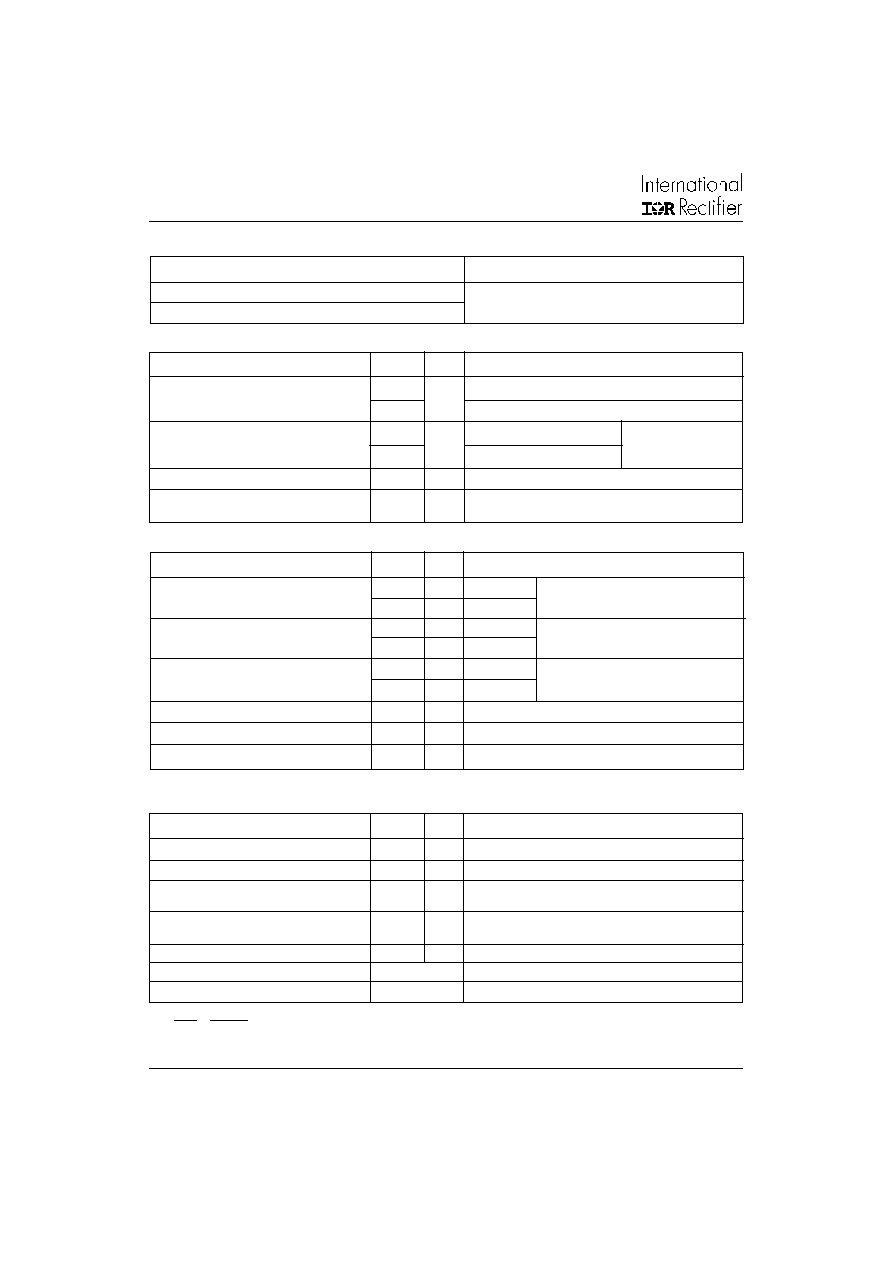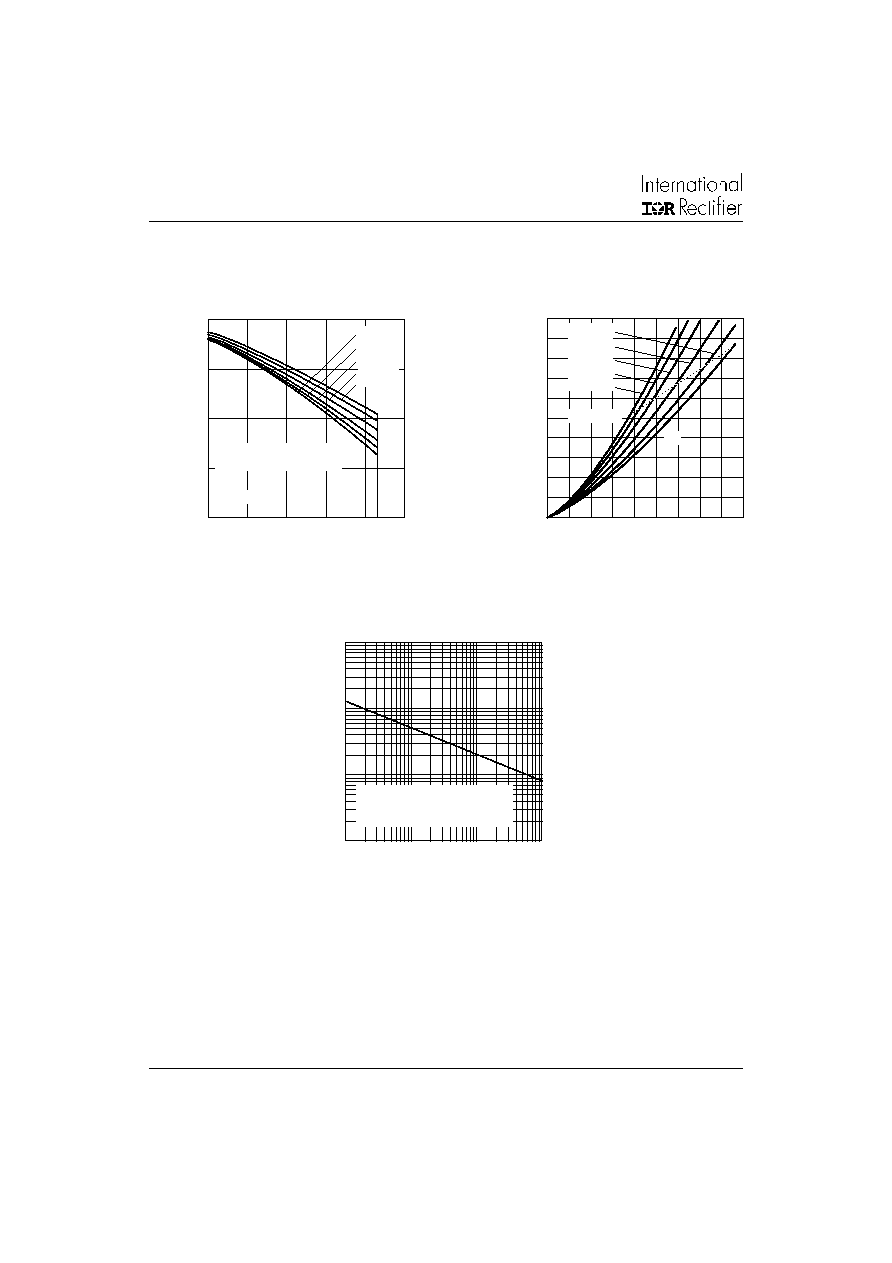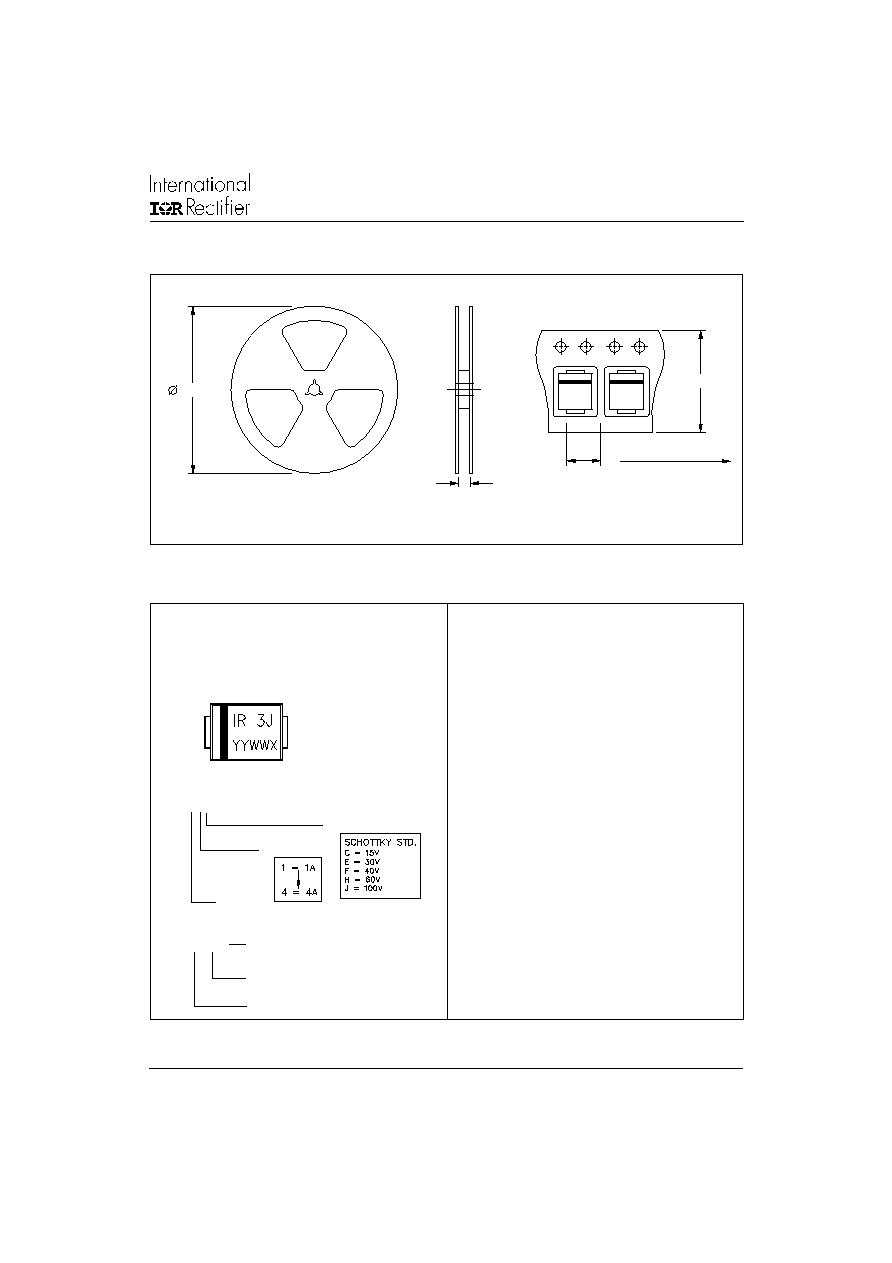 | –≠–ª–µ–∫—Ç—Ä–æ–Ω–Ω—ã–π –∫–æ–º–ø–æ–Ω–µ–Ω—Ç: 30BQ100TR | –°–∫–∞—á–∞—Ç—å:  PDF PDF  ZIP ZIP |

SCHOTTKY RECTIFIER
3 Amp
30BQ100
Bulletin PD-2.441 rev. F 05/02
1
www.irf.com
Major Ratings and Characteristics
I
F(AV)
Rectangular
3.0
A
waveform
V
RRM
100
V
I
FSM
@ t
p
= 5 µs sine
2100
A
V
F
@
3.0 Apk, T
J
= 125∞C
0.62
V
T
J
range
- 55 to 175
∞C
Characteristics
30BQ100 Units
The 30BQ100 surface-mount Schottky rectifier has been
designed for applications requiring low forward drop and small
foot prints on PC boards. Typical applications are in disk
drives, switching power supplies, converters, free-wheeling
diodes, battery charging, and reverse battery protection.
Small foot print, surface mountable
Very low forward voltage drop
High frequency operation
Guard ring for enhanced ruggedness and long term
reliability
Description/Features
SMC
Outline SMC
Dimensions in millimeters and (inches)
For recommended footprint and soldering techniques refer to Application Note # AN-994
5.59 (.220)
6.22 (.245)
6.60 (.260)
7.11 (.280)
2.75 (.108)
3.15 (.124)
.152 (.006)
.305 (.012)
2.00 (.079)
2.62 (.103)
0.76 (.030)
1.52 (.060)
.102 (.004)
.203 (.008)
7.75 (.305)
8.13 (.320)
Device Marking: IR3J
CATHODE
ANODE
1
2
1
2
POLARITY
PART NUMBER

30BQ100
Bulletin PD-2.441 rev. F 05/02
2
www.irf.com
Parameters
30BQ Units Conditions
V
FM
Max. Forward Voltage Drop (1)
0.79
V
@ 3A
0.90
V
@ 6A
0.62
V
@ 3A
0.70
V
@ 6A
I
RM
Max. Reverse Leakage Current (1)
0.5
mA
T
J
= 25 ∞C
5.0
mA
T
J
= 125 ∞C
C
T
Max. Junction Capacitance
115
pF
V
R
= 5V
DC
(test signal range 100KHz to 1Mhz) 25∞C
L
S
Typical Series Inductance
3.0
nH
Measured lead to lead 5mm from package body
dv/dt Max. Voltage Rate of Change
10000
V/µs
(Rated V
R
)
Part number
30BQ100
V
R
Max. DC Reverse Voltage (V)
100
V
RWM
Max. Working Peak Reverse Voltage (V)
Voltage Ratings
I
F(AV)
Max. Average Forward Current
3.0
A
50% duty cycle @ T
L
= 148 ∞C, rectangular wave form
4.0
50% duty cycle @ T
L
= 138 ∞C, rectangular wave form
I
FSM
Max. Peak One Cycle Non-Repetitive
2100
A
5µs Sine or 3µs Rect. pulse
Surge Current
100
10ms Sine or 6ms Rect. pulse
E
AS
Non Repetitive Avalanche Energy
5
mJ
T
J
= 25 ∞C, I
AS
= 2.8A, L = 10mH
I
AR
Repetitive Avalanche Current
0.3
A
Current decaying linearly to zero in 1 µsec
Frequency limited by T
J
max. Va = 1.5 x Vr typical
Parameters
30BQ Units Conditions
Absolute Maximum Ratings
Following any rated
load condition and
with rated V
RRM
applied
T
J
= 25 ∞C
Electrical Specifications
(1) Pulse Width < 300µs, Duty Cycle < 2%
V
R
= rated V
R
T
J
= 125 ∞C
Thermal-Mechanical Specifications
T
J
Max. Junction Temperature Range (*) - 55 to 175
∞C
T
stg
Max. Storage Temperature Range
- 55 to 175
∞C
R
thJL
Max. Thermal Resistance
12
∞C/W DC operation
Junction to Lead
(**)
R
thJA
Max. Thermal Resistance
46
∞C/W DC operation
Junction to Ambient
wt
Approximate Weight
0.24 (0.008) g (oz.)
Case Style
SMC
Similar to DO-214AB
Device Marking
IR3J
Parameters
30BQ
Units
Conditions
(**) Mounted 1 inch square PCB
<
thermal runaway condition for a diode on its own heatsink
(*) dPtot
1
dTj
Rth( j-a)

30BQ100
Bulletin PD-2.441 rev. F 05/02
3
www.irf.com
Fig. 2 - Typical Values Of Reverse Current
Vs. Reverse Voltage (Per Leg)
Fig. 3 - Typical Junction Capacitance
Vs. Reverse Voltage (Per Leg)
Fig. 4 - Max. Thermal Impedance Z
thJC
Characteristics (Per Leg)
Fig. 1 - Max. Forward Voltage Drop Characteristics
(Per Leg)
Instantaneous Forward Current - I
F
(A)
Forward Voltage Drop - V
FM
(V)
Reverse Current - I
R
(mA)
Reverse Voltage - V
R
(V)
Reverse Voltage - V
R
(V)
Junction Capacitance - C
T
(p F)
Thermal Impedance Z
thJC
(∞C/W)
t
1
, Rectangular Pulse Duration (Seconds)
0.1
1
10
0
0.2
0.4
0.6
0.8
1
1.2
T = 175∞C
T = 125∞C
T = 25∞C
J
J
J
0
0.0001
0.001
0.01
0.1
1
10
0
20
40
60
80
100
150∞C
125∞C
100∞C
75∞C
50∞C
25∞C
T = 175∞C
J
10
100
1000
0
20
40
60
T = 25∞C
J
0.1
1
10
100
0.00001
0.0001
0.001
0.01
0.1
1
10
100
Single Pulse
(Thermal Resistance)
D = 0.75
D = 0.50
D = 0.33
D = 0.25
D = 0.20
Notes:
1. Duty factor D = t1/ t2
.
2. Peak Tj = Pdm x ZthJC + Tc
.
2
t
1
t
P
DM

30BQ100
Bulletin PD-2.441 rev. F 05/02
4
www.irf.com
Fig. 4 - Maximum Average Forward Current
Vs. Allowable Lead Temperature
Fig. 5 - Maximum Average Forward Dissipation
Vs. Average Forward Current
Fig. 6 - Maximum Peak Surge Forward Current Vs. Pulse Duration
(2) Formula used: T
C
= T
J
- (Pd + Pd
REV
) x R
thJC
;
Pd = Forward Power Loss = I
F(AV)
x V
FM
@ (I
F(AV)
/
D) (see Fig. 6);
Pd
REV
= Inverse Power Loss = V
R1
x I
R
(1 - D); I
R
@ V
R1
= 80% rated V
R
Average Forward Current - I
F(AV)
(A)
Allowable Lead Temperature (∞C)
Average Forward Current - I
F(AV)
(A)
Average Power Loss (Watts)
Square Wave Pulse Duration - T
p
(Microsec)
Non-Repetitive Surge Current - I
FSM
(A)
0
0.5
1
1.5
2
2.5
0 0.5 1 1.5 2 2.5 3 3.5 4 4.5
DC
RMS Limit
D = 0.75
D = 0.50
D = 0.33
D = 0.25
D = 0.20
100
120
140
160
180
0
1
2
3
4
5
DC
see note (2)
Square wave (D = 0.50)
80% Rated Vr applied
D = 0.20
D = 0.25
D = 0.33
D = 0.50
D = 0.75
10
100
1000
10000
10
100
1000
10000
At Any Rated Load Condition
And With Rated Vrrm Applied
Following Surge

30BQ100
Bulletin PD-2.441 rev. F 05/02
5
www.irf.com
IR LOGO
YEAR
CURRENT
IR3J
VOLTAGE
YYWWX
WEEK
SITE ID
Marking & Identification
Ordering Information
30BQ SERIES - TAPE AND REEL
WHEN ORDERING, INDICATE THE PART NUMBER
AND THE QUANTITY ( IN MULTIPLES OF 3000
PIECES).
EXAMPLE:
30BQ100TR - 6000 PIECES
30BQ SERIES - BULK QUANTITIES
WHEN ORDERING, INDICATE THE PART NUMBER
AND THE QUANTITY ( IN MULTIPLES OF 1000
PIECES).
EXAMPLE:
30BQ100 - 2000 PIECES
Tape & Reel Information
Dimensions in millimetres and (inches)
16 (0.63)
FEED DIRECTION
8 (0.32)
16 (0.63)
330 (13)
Each device has 2 rows for identification. The first row
designates the device as manufactured by International
Rectifier as indicated by the letters "IR", and the Part
Number (indicates the current and the voltage rating).
The second row indicates the year, the week of
manufacturing and the Site ID.




